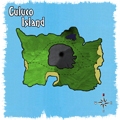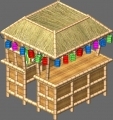Raymond Jacobs
Ethereal Darkness Interactive
First posted on 12 January 2009. Last updated on 06 April 2012.
Ethereal Darkness Interactive (EDI) is the mastermind behind the development of The Lost City of Malathedra, an indie adventure game with a vintage look that will immediately evoke memories of classic fantasy adventure games such as Chrono Trigger or Indiana Jones and the Fate of Atlantis.
With the recent announcement of its official release, there has been plenty of speculation about the origin of The Lost City of Malathedra—a game that, according to its developer, has been over 3 years in the making. EDI Games' previous commercial game, Morning's Warth, has gained a small but loyal fan base since its release back in 2005. Like many other independent game developers, the development of The Lost City of Malathedra has largely fallen on the shoulders of only a few dedicated individuals at EDI Games—including the company's founder and owner Raymond Jacobs.
Recently, we have had the privilege to interview Raymond Jacobs of EDI Games about The Lost City of Malathedra. In the interview, he speaks about the game's inspiration and development, the expectations he has from his fans, and the challenges he faces as an indie developer. Gamers who enjoy gaming nostalgia will undoubtedly find plenty of homage paid by his game to the classic adventure games of yesteryears.
The Lost City of Malathedra is now available as digital download from EDI Games' website.
Check out our gallery of concept art and production screenshots from The Lost City of Malathedra!
- The Lost City of Malathedra clearly carries a nostalgia factor for gamers who are fond of classic adventure games from the late 1980s and early 1990s. What past games inspire The Lost City of Malathedra? Why?
- As many classic adventure gamers may notice, Malathedra is heavily inspired from the LucasArts classics The Fate of Atlantis and The Dig. Being adventure gamers ourselves we've also drawn bits and pieces from the King's Quest series and have mixed in our own styles which we feel bring a certain freshness to the story.
- When did the development of The Lost City of Malathedra begin? How big was the development team? What was the most challenging part of the production process?
- We jumped into Malathedra right after Morning's Wrath (our first game) was released. The team for Malathedra has always been three people, but the very demanding role of co-developer changed hands a lot until Brian Linton joined the team. The most challenging part was controlling our ambition; it is easy to design a game that would just overwhelm our resources, so we found that we had to keep ourselves in check often.
- What is the basic premise of the story in The Lost City of Malathedra? Who are the major characters? Whom will the player control in the game?
- The story centers around the fictional city of Malathedra, an advanced civilization that inexplicably vanished. The player assumes the role of Rebecca Wolfe whose father, Jonathan, is obsessed with discovering the city. He stumbles on a vital clue, asks Rebecca to join him, and she goes about discovering the reasons why a lost city should sometimes remain as such.
- What is the etymology of the name "Malathedra"? Is it a play to the lost city of Atlantis? To what extent does the game's mythology about a lost land mirror other fictional mythologies and legends, such as the mythical continent Atlantida or Mu?
- The name Malathedra was designed to convey a tropical and yet roman type feel. Within the story Atlantis is actually framed as being the same legend but misinterpreted, but that is about where the parallels end.
- The game's story begins in the Caribbean. Why is the Caribbean chosen to be the setting for the game? What other places (real or fictional) will the player visit in The Lost City of Malathedra?
- We chose a fictitious Caribbean island because it worked with the fiery story of Malathedra; also, we wanted to give homage to the Monkey Island series and convey a partial similar feel. The game centers around Culuco Island for most of the game, but we can say that the island holds its share of secrets.
- The Lost City of Malathedra is built using a game engine that is developed entirely in-house. What is unique about your engine as compared to other engines such as Adventure Game Studio? What other games have been made using the EDITech game engine?
- Our engine (known as S3Engine) was designed with raw power and complete control in order to provide a modern spin to a classic genre. A complete Lua scripting engine allowed us to precisely tune every aspect of gameplay and, though our graphical style is intentionally retro, you'll find features common in today's advanced 3D engines (i.e: per-pixel-shader lighting, dynamic shadows, 3D sound).
- Why have you decided on using an isometric projection with a top down view for your game instead of a more traditional 2D or 2.5D view?
- We felt that an isometric view really helped scene exploration, we really liked how it was employed in Sanitarium. Aside from that, as developers, we feel like it's our job to mix it up a bit. Our next title (as of yet unannounced) uses a more traditional 2D scrolling view.
- Why have you decided to distribute and publish your own game online? Will there be a retail box release of the game? How difficult have you found in attracting interests from third-party game publishers and distributors?
- Online distribution helps us expand our market, we don't have plans for a retail box for Malathedra (like we did with Morning's Wrath). While it is true many gamers like to have a physical copy it seems that a lot of our players prefer the ease of a download coupled with the fact that we do not employ any forms of DRM (Digital Rights Management) to try and control how our players use their purchase. Currently we do business through affiliates and resellers.
- Morning's Wrath is the first game developed by Ethereal Darkness Interactive (The Lost City of Malathedra is the second). What influences from Morning's Wrath, if any, are there in The Lost City of Malathedra?
- There is a good heap of Morning's Wrath 'in-jokes' to be found in Malathedra; we also learned a lot about story-telling and how best to make scenes interesting. I think that our players will find once again great quality in story-telling and music as well as fun gameplay and memorable graphics.
- What kind of puzzles are in The Lost City of Malathedra? What will adventure game fans find most surprising about the game?
- Malathedra makes use of a lot of classic puzzle themes; some with new spins. We've been careful to avoid timed puzzles and puzzles that can result in an unwinnable game; we feel adventure games should be fun and can do without that kind of frustration.
We think adventure gamers will be most surprised by the story progression. Malathedra works to leave quite an impression on the player.
- Is there any plan for a sequel to The Lost City of Malathedra (even though it may be too soon to ask)?
- I would say there is a definite possibility that we'll see Rebecca again in another adventure.
- What lessons about game development have you learned from working on your own projects that may benefit other indie game developers?
- We learned a lot from Morning's Wrath, and applied it for Malathedra. One thing we would have done better would be to develop a more robust tool set to ease development; thankfully, we have done this for the S3Engine 2.0 which is already in its final stages and getting ready to power our generation of adventure and RPG games.



